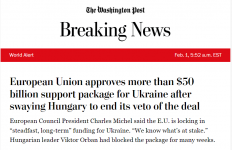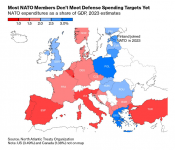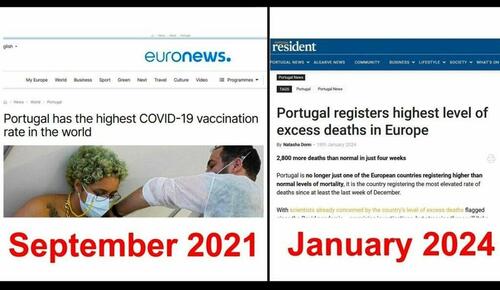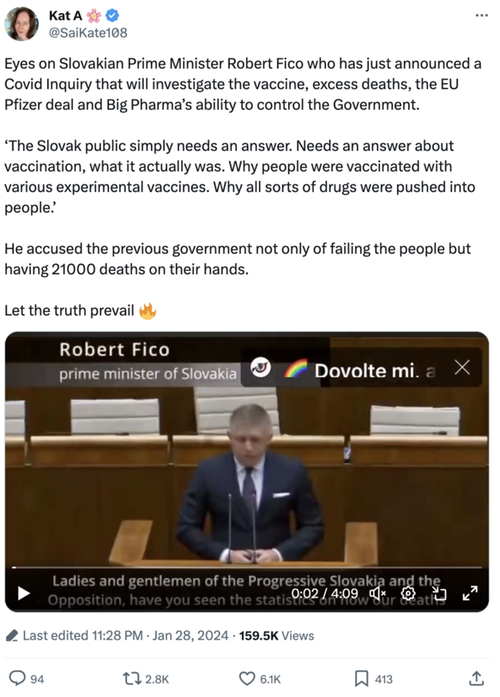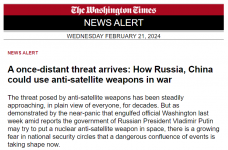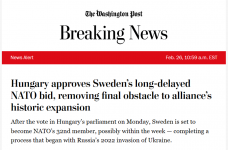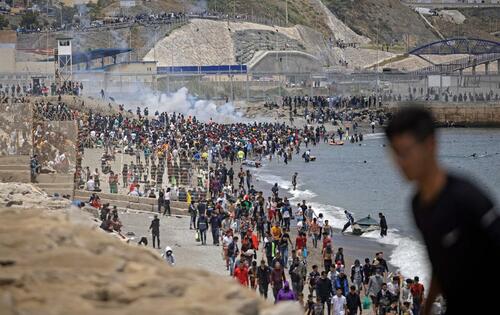Plain Jane
Just Plain Jane
January thread:
 www.timebomb2000.com
www.timebomb2000.com
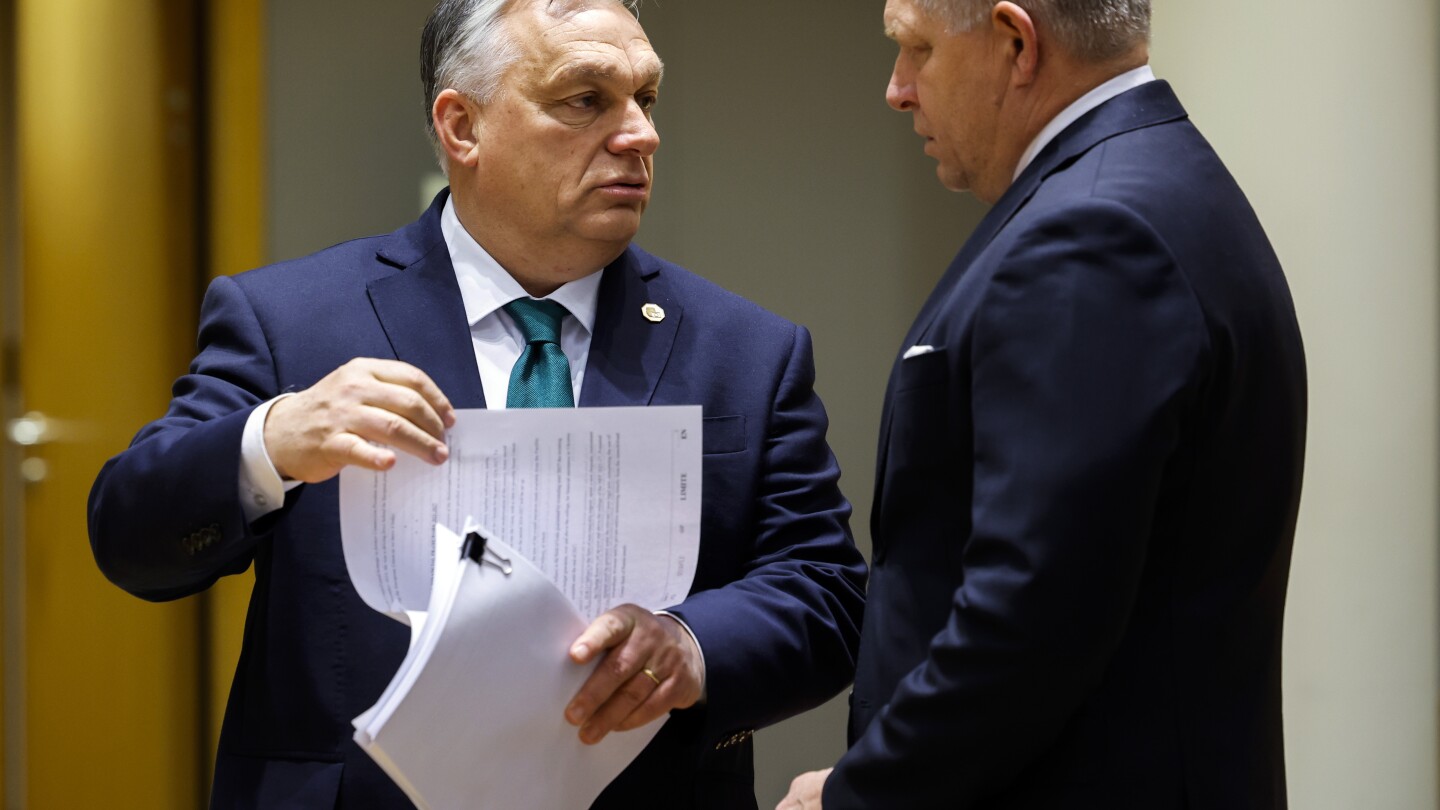
 apnews.com
apnews.com
LORNE COOK AND SAMUEL PETREQUIN
Updated 5:53 AM EST, February 1, 2024
Share
BRUSSELS (AP) — The leaders of the 27 European Union countries sealed a deal Thursday to provide Ukraine with a new 50-billion-euro ($54 billion) support package despite Hungary’s weeks of threats to veto the move.
European Council President Charles Michel announced the agreement about only an hour into the leaders’ summit in Brussels.
“We have a deal,” Michel said in a post on X, formerly known as Twitter. He said the agreement “locks in steadfast, long-term, predictable funding for Ukraine,” and demonstrated that the “EU is taking leadership and responsibility in support for Ukraine; we know what is at stake.”
It was not immediately clear if any concessions were made to secure Hungarian Prime Minister Viktor Orban’s approval. He raised staunch objections to the financial aid package in December and in the days leading up to Thursday’s summit in Brussels.
On their way into their meeting, several fellow leaders had lashed out at Orban, accusing him of blackmail and playing political games that undermined support for Ukraine and the country’s war-ravaged economy.
Almost two years after Russia’s invasion of Ukraine, the war has ground to a halt and Ukraine’s economy desperately needs propping up. But political infighting in the EU and in the United States has held up a long-term source of funding.
Concern has mounted that public support to keep pouring money into Ukraine has started to wane, even though a Russian victory could threaten security across Europe.
“There is no problem with the so-called Ukraine fatigue issue. We have Orban fatigue now in Brussels,” Polish Prime Minister Donald Tusk told reporters Thursday. “I can’t understand. I can’t accept this very strange and very egoistic game of Viktor Orban.”
In December, the 26 other leaders agreed on an aid package worth 50 billion euros ($54 billion) for this year through 2027. They also agreed to make Ukraine a candidate for EU membership, which Orban reluctantly accepted.
But the financial package was part of a review of the EU’s continuing seven-year budget, which requires unanimous approval.
Orban, the EU leader with the closest ties to Russia, is angry at the European Commission’s decision to freeze his government’s access to some of the bloc’s funds. The EU’s executive branch did so over concerns about possible threats to the EU budget posed by democratic backsliding in Hungary.
In response, Hungary vetoed statements at the EU on a range of issues. Orban’s also exported the problem to NATO, by blocking high level meetings with Ukraine until only recently. Budapest is also holding up Sweden’s bid for membership in the military organization.
“I don’t want to use the word blackmail, but I don’t know what other better word” might fit, Estonian Prime Minister Kaja Kallas told reporters as she arrived at EU headquarters.
“Hungary needs Europe,” she said, highlighting the country’s own economic problems and high interest rates. “He should also look into what it is in it for Hungary, being in Europe.”
Tusk insisted that there could be “no room for compromise on our principles, like rule of law. And for sure there is no room for compromise on the Ukraine question.” The recently elected Polish leader added: “If his position will dominate in Europe, then Ukraine will lose for sure.”
Irish Prime Minister Leo Varadkar said it was important for the leaders to try to seal a deal supported by all 27 member countries but that in any case “we can’t go away without an agreement.”
“That war is now raging for two years. Ukraine will not be able to continue to defend itself without the support of the European Union, and we can’t leave them short,” Varadkar told reporters.
German Chancellor Olaf Scholz said that “we want to finish what we started in December” and stressed that the planned 50 billion euros for Ukraine is “urgently necessary.”
“I will make a great deal of effort, together with many others, to make a decision by 27 (member states) possible,” Scholz said.
Ukrainian President Volodymyr Zelenskyy was scheduled to address the leaders via video link.
INTL - Europe: Politics, Economics, Military - January 2024
December 2023 thread: https://www.timebomb2000.com/xf/index.php?threads/europe-politics-economics-military-december-2023.640439/ https://apnews.com/article/bosnian-serbs-secession-threat-1072c96ce29c1f118a9b5a84bbd5ff9e Separatist Bosnian Serb leader Milorad Dodik vows to tear his country...
European Union overcomes threat of Hungary veto to seal $54 billion aid package for Ukraine
A top European Union official says the 27 EU countries have sealed a deal on aid to Ukraine just over an hour into a summit of the bloc’s leaders.
The EU agrees a new €50 billion aid package for Ukraine despite Hungary’s veto threat
LORNE COOK AND SAMUEL PETREQUIN
Updated 5:53 AM EST, February 1, 2024
Share
BRUSSELS (AP) — The leaders of the 27 European Union countries sealed a deal Thursday to provide Ukraine with a new 50-billion-euro ($54 billion) support package despite Hungary’s weeks of threats to veto the move.
European Council President Charles Michel announced the agreement about only an hour into the leaders’ summit in Brussels.
“We have a deal,” Michel said in a post on X, formerly known as Twitter. He said the agreement “locks in steadfast, long-term, predictable funding for Ukraine,” and demonstrated that the “EU is taking leadership and responsibility in support for Ukraine; we know what is at stake.”
It was not immediately clear if any concessions were made to secure Hungarian Prime Minister Viktor Orban’s approval. He raised staunch objections to the financial aid package in December and in the days leading up to Thursday’s summit in Brussels.
On their way into their meeting, several fellow leaders had lashed out at Orban, accusing him of blackmail and playing political games that undermined support for Ukraine and the country’s war-ravaged economy.
Almost two years after Russia’s invasion of Ukraine, the war has ground to a halt and Ukraine’s economy desperately needs propping up. But political infighting in the EU and in the United States has held up a long-term source of funding.
Concern has mounted that public support to keep pouring money into Ukraine has started to wane, even though a Russian victory could threaten security across Europe.
“There is no problem with the so-called Ukraine fatigue issue. We have Orban fatigue now in Brussels,” Polish Prime Minister Donald Tusk told reporters Thursday. “I can’t understand. I can’t accept this very strange and very egoistic game of Viktor Orban.”
In December, the 26 other leaders agreed on an aid package worth 50 billion euros ($54 billion) for this year through 2027. They also agreed to make Ukraine a candidate for EU membership, which Orban reluctantly accepted.
But the financial package was part of a review of the EU’s continuing seven-year budget, which requires unanimous approval.
Orban, the EU leader with the closest ties to Russia, is angry at the European Commission’s decision to freeze his government’s access to some of the bloc’s funds. The EU’s executive branch did so over concerns about possible threats to the EU budget posed by democratic backsliding in Hungary.
In response, Hungary vetoed statements at the EU on a range of issues. Orban’s also exported the problem to NATO, by blocking high level meetings with Ukraine until only recently. Budapest is also holding up Sweden’s bid for membership in the military organization.
“I don’t want to use the word blackmail, but I don’t know what other better word” might fit, Estonian Prime Minister Kaja Kallas told reporters as she arrived at EU headquarters.
“Hungary needs Europe,” she said, highlighting the country’s own economic problems and high interest rates. “He should also look into what it is in it for Hungary, being in Europe.”
Tusk insisted that there could be “no room for compromise on our principles, like rule of law. And for sure there is no room for compromise on the Ukraine question.” The recently elected Polish leader added: “If his position will dominate in Europe, then Ukraine will lose for sure.”
Irish Prime Minister Leo Varadkar said it was important for the leaders to try to seal a deal supported by all 27 member countries but that in any case “we can’t go away without an agreement.”
“That war is now raging for two years. Ukraine will not be able to continue to defend itself without the support of the European Union, and we can’t leave them short,” Varadkar told reporters.
German Chancellor Olaf Scholz said that “we want to finish what we started in December” and stressed that the planned 50 billion euros for Ukraine is “urgently necessary.”
“I will make a great deal of effort, together with many others, to make a decision by 27 (member states) possible,” Scholz said.
Ukrainian President Volodymyr Zelenskyy was scheduled to address the leaders via video link.

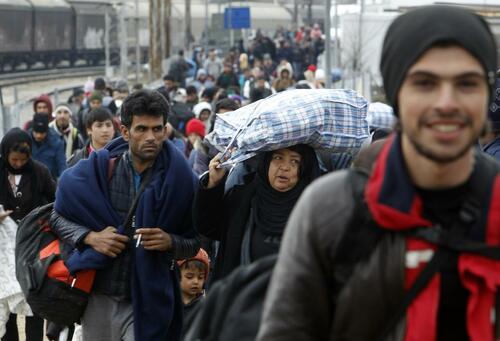 (AP Photo/Boris Grdanoski)
(AP Photo/Boris Grdanoski)